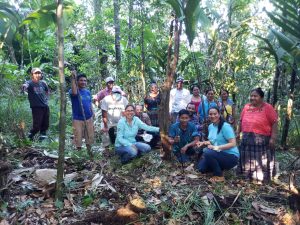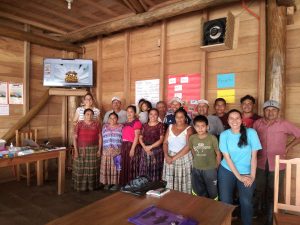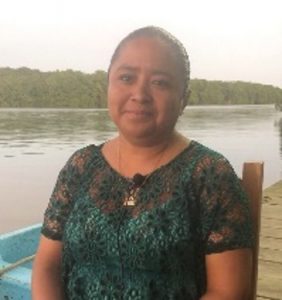Beekeeping in the Mangroves of Guatemala
Today, 35% of the world’s mangroves have disappeared.

Participants in the project visit the site where the beehives will be installed.
The Key Role of the Mangroves
Mangroves are incredibly precious ecosystems. These tropical forests, which grow in saltwater, are nature’s ramparts against coastal erosion, floods and storms, as well as against rising sea levels. They are also home to a wide variety of marine species and contain 3 to 4 times more CO2 than other forests. In developing countries in particular, coastal communities depend directly on the products and services that come from these ecosystems.
Unfortunately, many years of large-scale over-exploitation, due mainly to the constant demand for resources by international markets, have contributed to the destruction of the mangrove forests. In the Caribbean, loss of mangroves is a direct threat to the physical, economic and food security of coastal populations.

Project participants with their children.
What is the Link Between Mangroves and Beekeeping?
The Pure Ocean Fund at Myriad Canada, supports innovative scientific projects around the world to preserve marine biodiversity. The Fund is supporting a project carried out with the Mundo Azul Foundation to develop a local beekeeping initiative in the protected area of Rio Sarstùn in Guatemala. The objective is to strengthen the resilience of coastal communities and the mangrove ecosystem.
Founded in 2014, Mundo Azul Foundation’s mission is to promote the conservation of natural resources in fishing communities; economic alternatives that ensure the social protection of these communities; and education about the environment. With that objective in mind, this project aims to promote beneficial ‘interaction’ between mangroves and bees in order to provide a supply of honey – but also, thanks to the bees, to ensure the propagation of the mangroves.
Following a consultation with the inhabitants of the Sarstún community, a protected area of eastern Guatemala on the southern border of Belize, 25 people (12 women and 13 men) joined the project. Through five training modules, the participants were introduced to the various aspects of apiculture, including bees’ behavior, the use of material and equipment, harvesting the products from the beehives and a study of the area in which the beehives will be installed.

Sonia Tiul
“For me, apiculture is a really important activity, because it represents an economic alternative that provides financial support for groups of fishermen and women in the community,” said Sonia Tiul, an inhabitant of the Barra Sarstún community and one of the project’s participants.

Servando Edua Osorio
Servando Edua Osorio, another participant from the Barra Sarstún community, told us “I had always wanted to do something like this in my life and it’s what attracted me to the project. Beekeeping brings so many advantages to the community. It’s a good source of employment for us, the older members of the community, but it also enables us to pollinate our crops.”
The training sessions are delivered by an expert in the field of beekeeping, who was also responsible for finding the most suitable place to set up the beehives. “We work with our consultant, who has a great deal of experience on this subject”, explained Marielos Rosales, Education and Leadership Coordinator at the Mundo Azul Foundation. “It’s she who raises the bees and who makes sure that there is no danger for the bees in the area chosen for installing the beehives.”
In an effort to make this project inter-generational, educational workshops on the environment are offered to the children of the adult participants in the project. The children learn all about bees and the crucial role they play within our ecosystems.
And the last but essential stage of the project is – of course – the installation of the beehives!
Click here to view the video testimonial from Sonia, and here to view the one from Servando (in Spanish with English text provided).
For further information, contact Myriad Canada at info@myriadcanada.org.

